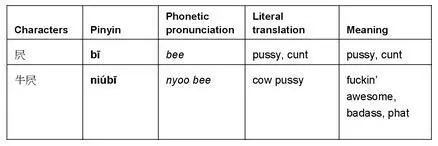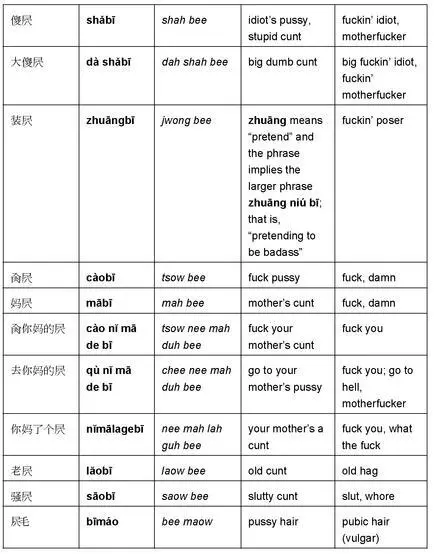And now, as Chinese spectators at sports games or encouraging parents might yell, 加油! jiāyóu!(jah yo). Literally “refuel” or “add gasoline,” it also means “let’s go!”
CHAPTER ONE. Cow Pussy, Yes, Cow Pussy

Let’s begin with… cow pussy. Or rather, 牛屄 niúbī ( nyoo bee ), which literally translates to “cow pussy” but means “fuckin’ awesome” or “badass” or “really fuckin’ cool.” Sometimes it means something more like “big” and “powerful,” and sometimes it can have the slightly more negative meaning of “bragging” or “braggart” or “being audacious,” but most of the time it means “fuckin’ awesome.”
The etymology of niúbīis unknown. Some say the idea is that a cow’s pussy is really big, so things that are similarly impressive are called cow cunts. Others say that it stems from the expression 吹牛皮 chuī niúpí ( chway nyoo pee ), which literally translates to “blow up ox hide” and also connotes bragging or a braggart (someone who can blow a lot of air). In fact, the word for bragging is the first part of that phrase, 吹牛 chuīniú ( chway nyoo ). Once upon a time (and you can still see this done today in countries like Pakistan), people made rafts out of animal hides that had to be blown up with air so they would float. Such an activity obviously required one mighty powerful set of lungs, and so it is thought that niúbīderives from chuī niúpí both because of the association with power and bigness and because the two expressions rhyme.
Some people merely use the shortened 牛 niú ( nyoo )-that is, the cow minus the cunt-to mean “awesome” or “great.” Unlike niúbī, saying niúis not really vulgar, much like saying “that sucks” instead of “that fuckin’ sucks dick.”
Despite its generally positive meaning, niúbīis a dirty, dirty word-dirty enough that the character for “pussy” or “cunt,” 屄 bī ( bee ), was removed from the Chinese character set years ago and cannot be typed on most computers. Your average Chinese doesn’t even know how to write it; others do but choose not to write the real character because it is so dirty. When people use the word niúbī online, they often write牛B or NB because N and B are the first letters of the pinyin syllables niú and bī. Roman letters are frequently used in this way, as informal abbreviations of Chinese words. For example, Beijing is often abbreviated BJ, and Shanghai SH, as it is easier than typing out the Chinese characters, which can be a somewhat arduous process.
You’ll also often see niúbī written牛比 or 牛逼 instead of 牛屄. The characters 比 and 逼 are homonyms of 屄; they have completely different meanings but are also pronounced bee , and so they are used as stand-ins. Chinese has a huge number of homonyms-syllables that sound the same but have different meanings-and as you’ll see with many of the terms throughout this book, this makes for a lot of wordplay and puns.
Niúbī started out as Beijing slang but has spread enough that it is fairly ubiquitous throughout the country, in particular at any event involving a large population of punk rockers, hip young Chinese, or your average, beer-drinking man. Rock shows and soccer matches are especially prime hot spots. A really hot band or a particularly impressive sports move is 太牛屄 tài niúbī ( tie nyoo bee ), “too fuckin’ awesome,” or 真牛屄 zhēn niúbī (d zen nyoo bee ), “really fuckin’ awesome,” or-my own favorite construction- 牛屄死了niúbī sĭ le (nyoo bee sih luh), which literally translates “fuckin’ awesome to the point of death.”
Those last few phrases point to one of the most satisfying things about the Chinese language: the modular way that everything-characters, words, phrases, sentences-is constructed. In that last phrase, niúbī sĭ le, the individual component 死 sĭ ( sih ) is itself a word meaning “die” or “death.” Adding the larger component 死了sĭ le ( sih luh ) after an adjective is a common way of amping up the meaning of the adjective. So we can swap out niúbīand plug other words into the phrase-for example 饿 è ( uh ), which means “hungry.” If you are 饿死了è sĭ le ( uh sih luh ), you are absolutely starving; that is, “hungry to the point of death.”
Almost every syllable in Chinese is itself a word, and larger words are constructed by simply linking these syllables together. The result is a remarkably logical language in which the components of a word often explain, very literally, the meaning of that word. Thus a telephone is 电话 diànhuà ( dyinn hwah ), literally “electric speech,” and a humidifier is 加湿器 jiāshīqì ( jah shih chee ), literally “add wetness device.” (That said, you shouldn’t get too preoccupied with the literal meaning of every single word, as the components of a word may also be chosen for reasons unrelated to its meaning, such as pronunciation.)
Individual Chinese characters (that is, the symbols that make up Chinese writing) tend to be modular as well, composed of discrete components (or “radicals”) that may carry their own meaning and that often help explain the overall meaning of the character. The character for “pussy,” 屄 bī ( bee ), for example, is constructed of the radical for “body,” 尸 shī ( sheuh ), and 穴 xuè ( shreh ), meaning “hole” (which is why so many people are uncomfortable writing the correct character for this word-it just looks incredibly dirty).
Thanks to the modularity of Chinese, a word like niúbīcan be thought of as being constructed of two building blocks (“cow” and “pussy”) that can be taken apart and combined with other building blocks to make new (and often impressively logical) words. Thus on the “cow” side, we have words like:

And on the “pussy” side? This is where things get fun. For your convenience, below is a handy table-a cunt chart, if you will-of some of the many dirty words that use bī:

*

CHAPTER TWO. The Chinese Art of Everyday Abuse
One of the first words you’ll learn in Chinese class is 你好 nĭhǎo ( nee how ), which means “hello.” However, the fact is that Chinese people don’t actually say nĭhǎo all that often. Instead, when you arrive for dinner, a party, or a meeting, they’ll say, “You’ve arrived,” 你来了 nǐ lái le ( nee lie luh ). When you depart, someone will say, “You’re going,” 你走啦 nǐ zǒu la ( nee dzoe lah).
When I walk down the street on a windy day, it seems the conversation is the same for everyone I pass. The granny taking her granddaughter out for a stroll will exclaim, as she lifts the little girl into her stroller, “It’s windy!” The two middle-aged men running into each other on the street will greet each other by saying, “So windy today!” When I get home, the trash collector sitting on my stoop will welcome me back by announcing, “What a windy day!”
Читать дальше














